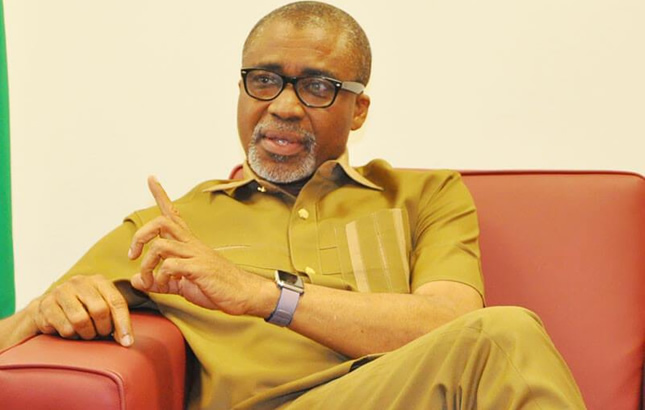Former Senate Minority Leader Enyinnaya Abaribe says the absence of synergy between the Nigerian National Petroleum Corporation Limited (NNPC) and the Nigerian Navy may be stalling the monstrous fight against oil theft.
He also said the failure of security agencies to stamp out kidnapping and banditry exposes collusion between criminals and security agents.
The lawmaker, who has been representing Abia South Senatorial District since 2007 in the National Assembly, spoke on Inside Sources with Laolu Akande aired on Channels Television on Friday.
He lamented that despite the many technological tools available at the disposal of security agencies, oil theft, kidnapping, and insurgency still continue at alarming scale.
- Climate change: NNPC Ltd/Total Energies achieves zero gas flare
- Bandits kill Abuja resident after N20m ransom, threaten to execute more captives
The ex-deputy governor of Abia State said, “If anybody tells you that we don’t know who steals oil, the ships that are moving up and down, in this day and age, the person is not saying the truth. Technology has made it such that you can track a human being. The earth has geo-satellite everywhere, even infrared. You can track these ships.”
“OPEC says our quota is two million barrels a day or more. What are we doing? We are doing less than a million barrels. We must have to deal with that supply side.
“I went to the office of the Chief of Naval Staff. He had this screen in his office. He could see Takwa Bay, see that. And I said to him, ‘Sir, I didn’t know that you had all this. That means we can track this and that. So, what’s the real problem?’
“He said there is no linkage between us and NNPC. So, we don’t know what NNPC is doing. Who is telling us this type of story. It’s one country, one president, and then the left hand does not know what the right hand is doing, and you expect us to swallow that?” he queried.
Abaribe, a critic of the then President Muhammadu Buhari administration, recalled when he was arrested by the Department of State Services (DSS) years back before the advent of the National Identification Number (NIN). According to him, the security police tracked him using his mobile phone.
“When I was arrested in front of a barber’s shop in Abuja. One of the DSS directors was interrogating me, and I was bantering with him and I asked him how they knew where I was because I was driving myself in a small car. He said, ‘We just used your phone to track you’.
“There was no NIN then. Now every phone has a NIN; there was no BVN, now every bank account has a BVN. And then some people demand a ransom of N20m, and the money was paid into an account, and then the security people tell you they are unable to track the kidnappers.
“There are just some collusion going on, and there is no concerted effort to deal with it. It’s just more or less like a sense of malaise; everyone says not my problem, not my issue,” Abaribe said.
In January, seven members of a family, including six sisters, were kidnapped in the Bwari area of Abuja, and the kidnappers had demanded about N100m as ransom. One of the victims, Nabeeha Al-Kadriyar, was killed while the others regained freedom.
Commenting on the development, a former Minister of Communications and Digital Economy, Isa Pantami, had said security agents weren’t using the NIN to track kidnappers and other elements engaging in nefarious activities.
The host, ex-presidential aide Akande, brought up the issue of Pantami saying that security agencies have not been using the NIN technology he championed. Akande said it is disturbing that none of the security agencies have debunked what the ex-minister said.
The Senate Minority Leader further stated that security challenges can be solved with the enforcement of penalties. “If you are responsible for something and you don’t do it, you pay the penalty for it. If you have to go to jail, you go to jail. If that happens and somebody sees that you are a leader that is able to crack head for the rest of the polity, you will see a change.
“The basic problem is that there is no penalty for malfeasance, no penalty for not doing the job that is given to someone,” he said.

 Join Daily Trust WhatsApp Community For Quick Access To News and Happenings Around You.
Join Daily Trust WhatsApp Community For Quick Access To News and Happenings Around You.

